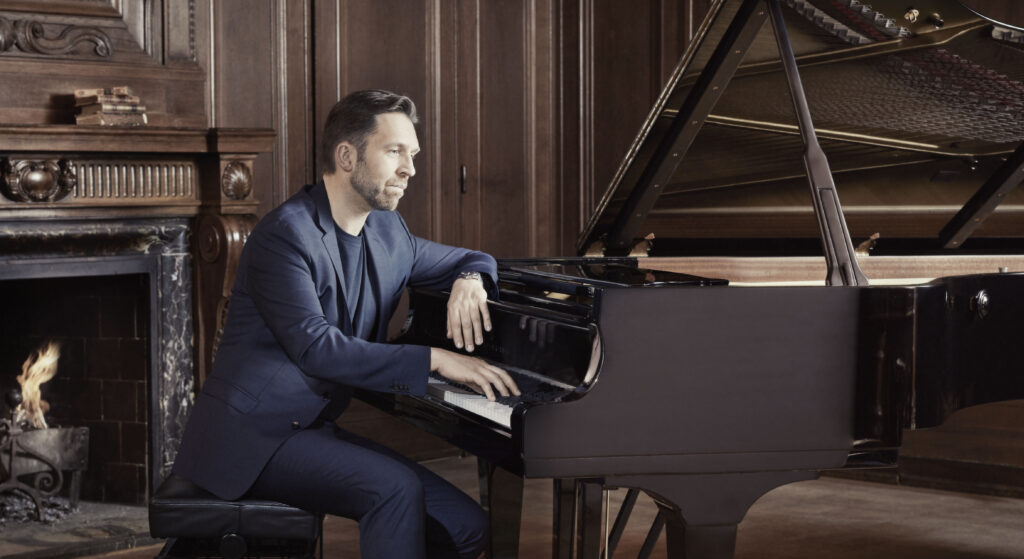Leif Ove Andsnes – Beethoven takes you by the hand
There are apparently some pianists who, despite the anniversary, are not devoting them exclusively to Beethoven this year. Anyway, with his Beethoven Journey project, Leif Ove Andsnes has already done his bit, making one of the most beautiful recordings of the piano concertos. For Andsnes, Mozart is currently uppermost on the agenda, even if there is also plenty of Beethoven being played at his festival too. Time for another conversation with the Norwegian master pianist.

Together with the Mahler Chamber Orchestra, which also participated in the Beethoven Journey, Leif Ove Andsnes is recording Concertos Nos 20–22, to be followed next year by Nos 23 and 24 and the aria ‘Ch’io mi scordi di te’ with the soprano Christiane Karg. The piano trios and quartets have already been recorded with members of the Mahler Chamber Orchestra.
‘All of these concertos were written in 1785 and 1786. The previous year Mozart had already composed six piano concertos, and fewer than three years separate Nos 14 and 25! It’s incredible how fast this genre developed in his hands. In Concerto No. 20 Mozart then introduced something radically new: the soloist answers the orchestral introduction with a wholly independent statement that is totally unrelated to what was heard before. This is a new narrative style, and in the concertos that followed Mozart becomes freer still. Beethoven takes up the same idea: in each of his piano concertos he too has the soloist begin with something unexpected. In the Fourth Concerto he even leaves out the orchestral introduction completely, and in the Fifth it consists of a just single chord, after which the pianist, the heroic protagonist, comes on stage – the precursor of the Romantic piano concerto.’
You recorded the Beethoven concertos without a conductor, and on the video you seem to be conducting with your eyes.
‘It’s a risky business – in the Fifth Concerto I have to play all the time. (laughs) You don’t have any time at all to conduct, but you still have to convey the appropriate energy in the tutti entries. With Mozart you can achieve a lot through eye contact, thorough rehearsals and listening to each other. It’s more like chamber music, it also works without anyone standing there waving a baton. Conductors often tell me that they feel rather superfluous in Mozart’s music. I don’t regard myself as a conductor, and I would never dream of conducting symphonies. I need the piano.’
For three years you played almost nothing but Beethoven. Is that a way of getting deeper into the music?
‘You know, pianists are like chameleons. We constantly switch between different styles and face the challenge of choosing our repertoire. There’s so much of it! I’ve been making recordings since I was 20, and that has helped me to focus. Beethoven aroused a strong desire within me to explore his music comprehensively, and yet I wouldn’t be in a hurry to play all of his sonatas. In the case of the concertos, however, it’s very interesting to play all five of them. I had always thought that there are numerous correspondences between the Third and the Fifth, for example in their militaristic bearing. But now that I have engaged with them so intensively in a single project, I have come to realize that they could not be more different. No. 3 is Sturm und Drang, with different emotions every couple of bars, whilst No. 5 is a great and, above all, free narrative.’
We often hear about Beethoven’s humanitarian message. Do you feel that too?
‘Absolutely! I have experienced situations in which I felt that Beethoven was taking my hand and saying “Everything will be fine”. At the time of 9/11 I was in New York; I had to stay there four days longer than planned because there were no flights. After a couple of days there were already memorial concerts, and I heard one of the late quartets. It moved me so much; it was just the sort of music that you need in such a crisis. Beethoven has an unbelievable healing power; his music is an avowal of friendship. In every respect it offers comfort. Bach also gives character to human emotions, and with Mozart you feel that he is looking down on us and comprehending our suffering. But Beethoven is even closer to the human aspect; that’s what he is like. Despite all his material and health problems, there is never a trace of self-pity in his music. He is always looking upwards, and he raises you up.’
Do you have a different feeling when you play Chopin, for instance?
‘Oh yes, Chopin is incredibly profound but also enigmatic and hard to grasp. Sometimes it resembles superficial beauty, but then again there are moments of remarkable loneliness. Beethoven is never theatrical in the way that Mozart can be. Everything always comes straight from the heart, or as he himself said: ‘Von Herzen – möge es wieder zu Herzen gehen’ (‘Arising in the heart, may it return to the heart’). Beethoven is always honest. Even when he whispers in pianissimo, he’s never vague. Everything is clear, there is always a message.
With Chopin and also Schumann you feel a very personal connection to the composer, but Beethoven speaks to many people at the same time. It took me a long time to feel the radiant greatness and the humanity especially in his slow movements, even in the First Concerto. Now I find it incredible.’
Will you return to this Beethoven period?
‘Certainly, but it was too soon after my Beethoven Journey to play a lot of Beethoven again. And also: it’s actually Beethoven year every year, as he’s the most frequently played composer in the world anyway. And Beethoven is the theme at my festival in Rosendal. I wanted to give a complete picture of him, with unknown works, but also with the Op. 111 Sonata, the Diabelli Variations and some of the late string quartets.’

Rosendal Chamber Music Festival
Rosendal is located on the Hardanger Fjord, where there’s a great tradition of folk music. Is that why you are focusing on this aspect of Beethoven?
(laughs) ‘The locals who come to the festival may well perceive that in the background. Beethoven often drew inspiration from folk music. Even if he transformed it into something great, the material he started with was often very simple. Rosendal has only a couple of thousand inhabitants, but with its manor house from 1665 and its splendid little church, which is much older, it has a unique atmosphere. The English garden around the house, nature with Bergen and the fjord – that’s something very special. I’ve been going there for almost thirty years and have given my most intimate concerts there to an audience of 70 or 80 people.’
Is it easier to feel a connection with the music in such an environment
‘Yes, I think it is; there are more and more festivals in remote places such as Rosendal. Quite different from in town, where you have to search for a parking place, you’re already stressed when you go into the concert hall and need half an hour to acclimatize. In Rosendal your soul is at peace; there you find only beauty and quiet. You’re only there for the music.’
Rosendal Festival, 6–9 August. Pianists performing alongside Leif Ove Andsnes include Paul Lewis, Jonathan Biss, Vikingur Ólafsson and Kristian Bezuidenhout. www.baroniet.no/en/rosendal-festival
Author: Eric Schoones
Photo credit: Gregor Hohenberg
This article is a contribution from the German and Dutch magazine Pianist through Piano Street’s International Media Exchange Initiative and the Cremona Media Lounge.
 Pianist Magazine is published in seven countries, in two different editions: in German (for Germany, Austria, Switzerland, Luxemburg and Liechtenstein) and in Dutch (for Holland and Belgium).
Pianist Magazine is published in seven countries, in two different editions: in German (for Germany, Austria, Switzerland, Luxemburg and Liechtenstein) and in Dutch (for Holland and Belgium).
The magazine is for the amateur and professional alike, and offers a wide range of topics connected to the piano, with interviews, articles on piano manufacturers, music, technique, competitions, sheetmusic, cd’s, books, news on festivals, competitions, etc.
For a preview please check: www.pianist-magazin.de or www.pianistmagazine.nl
Comments
What a wonderful perspective he has on Beethoven! “Despite all his material and health problems, there is never a trace of self-pity in his music. He is always looking upwards, and he raises you up.” I have never thought about this, but it is so accurate!